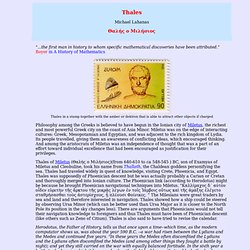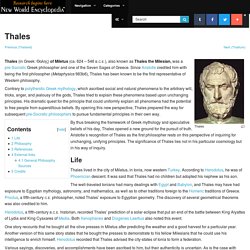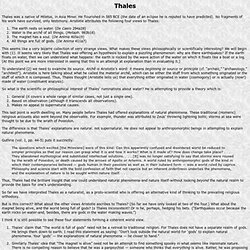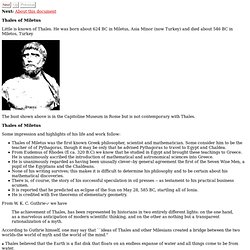

Thales of Miletus (Greek philosopher. Thales of Miletus, Mathematics and Life. “...the first man in history to whom specific mathematical discoveries have been attributed.”

Boyer in A History of Mathematics Thales in a stamp together with the amber or ilektron that is able to attract other objects if charged Philosophy among the Greeks is believed to have begun in the Ionian city of Miletus, the richest and most powerful Greek city on the coast of Asia Minor. Miletus was on the edge of interacting cultures: Greek, Mesopotamian and Egyptian, and was adjacent to the rich kingdom of Lydia. Its people travelled, giving them an awareness of conflicting ideas, which encouraged thinking. Thales of Miletus (Θαλής ο Μιλήσιος)(from 640-610 to ca 548-545 ) BC, son of Examyas of Miletus and Cleobuline, took his name from Thallath, the Chaldean goddess personifying the sea.
Herodotus, the Father of History, tells us that once upon a time--which time, as the modern computator shows us, was about the year 590 B.C. Socrates. The Philosophy of Thales. Thales summary. Thales. Thales Thales (in Greek: Θαλης) of Miletus (ca. 624 – 546 B.C.E.), also known as Thales the Milesian, was a pre-Socratic Greek philosopher and one of the Seven Sages of Greece.

Since Aristotle credited him with being the first philosopher (Metaphysics 983b6), Thales has been known to be the first representative of Western philosophy. Contrary to polytheistic Greek mythology, which ascribed social and natural phenomena to the arbitrary will, tricks, anger, and jealousy of the gods, Thales tried to explain these phenomena based upon unchanging principles. His dramatic quest for the principle that could uniformly explain all phenomena had the potential to free people from superstitious beliefs.
By opening this new perspective, Thales prepared the way for subsequent pre-Socratic philosophers to pursue fundamental principles in their own way. Thales lecture. Thales was a native of Miletus, in Asia Minor.

He flourished in 585 BCE (the date of an eclipse he is reputed to have predicted). No fragments of his work have survived, only testimony. Aristotle attributes the following four views to Thales: The earth rests on water. (De Caelo 294a28) Water is the archê of all things. This seems like a very bizarre collection of very strange views. To understand (2) we need to examine its source. So what is the scientific or philosophical interest of Thales’ ruminations about water? General (it covers a whole range of similar cases, not just a single one). This last point is worth dwelling on. The difference is that Thales’ explanations are natural. not supernatural. Guthrie (vol. The questions which excited [the Milesians] were of this kind: Can this apparently confused and disordered world be reduced to simpler principles so that our reason can grasp what it is and how it works?
But is this correct? Final comments: Go to next lecture on Anaximander. Thales of Miletus. Next: About this document Thales of Miletus Little is known of Thales.

He was born about 624 BC in Miletus, Asia Minor (now Turkey) and died about 546 BC in Miletos, Turkey The bust shown above is in the Capitoline Museum in Rome but is not contemporary with Thales. Some impression and highlights of his life and work follow: Thales of Miletus Thales. Thales of Miletus (/ˈθeɪliːz/; Greek: Θαλῆς (ὁ Μιλήσιος), Thalēs; c. 624 – c. 546 BC) was a pre-Socratic Greek philosopher from Miletus in Asia Minor, and one of the Seven Sages of Greece. Many, most notably Aristotle, regard him as the first philosopher in the Greek tradition.[1] According to Bertrand Russell, "Western philosophy begins with Thales.
"[2] Thales attempted to explain natural phenomena without reference to mythology and was tremendously influential in this respect. Almost all of the other Pre-Socratic philosophers follow him in attempting to provide an explanation of ultimate substance, change, and the existence of the world without reference to mythology. Those philosophers were also influential and eventually Thales' rejection of mythological explanations became an essential idea for the scientific revolution. PHILOSOPHY DIGEST: Thales.